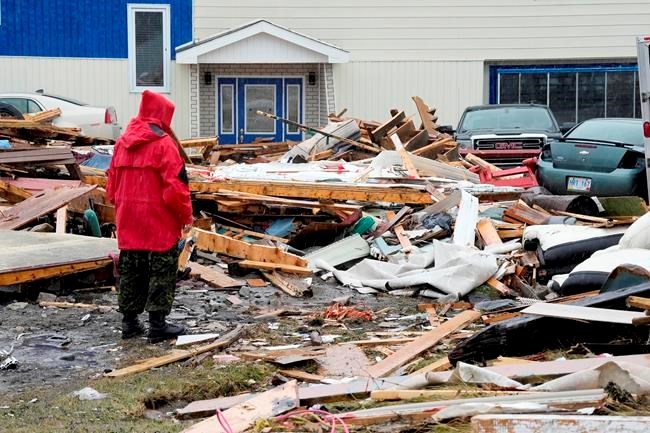CHANNEL-PORT AUX BASQUES, N.L. — Denise Anderson shouted a list of items into her phone over the sound of pouring rain, along with instructions on how to find them: clean socks, a new pack of underwear, prized pieces of jewelry and important documents.
Her husband was inside their house that faces the waterfront of Port aux Basques, N.L., days after post-tropical storm Fiona carried destruction through their small southwestern Newfoundland community of about 4,000 people, demolishing homes and claiming the life of a 73-year-old woman.
"I don't want to go in," Anderson said Monday from the road overlooking her property. It was strewn with debris -- broken pieces of wood, tires, plastic coolers, an upside-down ATV and other vehicles pushed up against the side of the house.
Anderson was concerned about the safety of the stairs inside the house, but the couple needed clean clothes and other essentials to get by while they settle into what might be a long wait for their home to be deemed structurally sound.
It was the second time returning to their home since the storm hit, supervised by emergency response workers on the quick run for essentials.
"As you can see, I'm going to be quite a while before I'm allowed back in," Anderson said, her voice breaking with emotion as she surveyed the scene.
Anderson had just moved back to the town she grew up in after more than a decade living in Ontario, but now she and her husband are among the dozens of residents who have been displaced after the storm. Walls and roofs were ripped off some houses, others were swept away into the ocean.
Across the street from Anderson's home, closer to the angry waves, a neighbour's red house stands crumpled into itself, an oven spilling from its walls. Similar scenes of destruction were visible throughout the town as emergency responders escorted people into their homes to retrieve items.
Andrew Parsons, who represents the area in the provincial legislature, said at a Monday news conference that finding accommodations for displaced residents will be a major issue.
Shelters and hotels have been made available for those in immediate need. Many like Anderson and her husband are staying with family nearby, but Parsons said finding long-term accommodations for people may require tapping into resources like cabins and homes owned by seasonal residents.
"Luckily we don't have a situation where people don't have somewhere to go. Being a small community, people have friends and family," he said. "That only lasts so long. We need to find those solutions for the next number of months."
The province is also assessing exactly how many homes were damaged in the storm as it works on a relief fund to help residents either rebuild or relocate, Premier Andrew Furey said Monday.
Channel-Port aux Basques Mayor Brian Button said people have been looking after their neighbours and loved ones who have been displaced. But the scale of the damage has been difficult to grapple with, he said, comparing the situation to a disaster movie in some areas.
"It's been a hard time for a lot of people," he said from the town council office building, between meetings and trips into the rain where recovery efforts were ongoing. "Seeing all this devastation in the town I grew up in is very hard."
Standing outside her home, Anderson said she feels like "one of the lucky ones" to have her house still mostly standing and the support of her "small but mighty" community. But she said she's not sure she will ever feel safe returning.
"I can't sleep now, so (I'm) not sure I'm going to be able to sleep when I'm allowed to settle back into my beautiful home," she said, recalling the day she saw a neighbour being almost swept way and watching "everything just crumble like a bomb went off."
"The ocean is very scary," she said, gesturing towards the waves. "I love it. I wanted to be by the ocean. Not so much anymore."
This report by The Canadian Press was first published Sept. 27, 2022.
Holly McKenzie-Sutter, The Canadian Press




